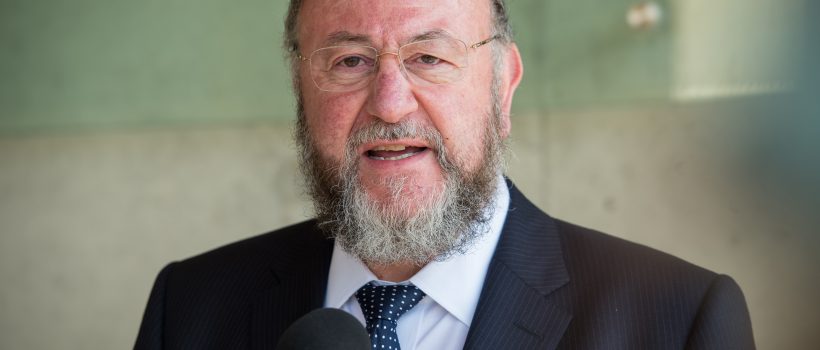The Times: Let’s make Jerusalem worthy of its meaning — peace

As we embark on our Yom Yerushalayim 50th anniversary celebrations, the Chief Rabbi writes in The Times about the special meaning behind the name ‘Jerusalem’.
Earlier this month, I accompanied the Archbishop of Canterbury, the Most Rev Justin Welby, on his pilgrimage to Jerusalem. It was an opportunity for me to convey to him the centrality of the city for Jews around the world, particularly as we prepare this week to celebrate the 50th anniversary of its reunification during the Six-Day War (after Jordan’s annexation of the eastern half of the city in 1948). As we prayed together at the Western Wall, I reflected on the name Jerusalem.
In Jewish tradition, names are a way of describing the very essence of a person, object or place. The original name for Jerusalem was Shalem, meaning whole or complete, the root of the word shalom, which means peace. Shem, son of Noah, gave it this name. Having survived the trauma of the great biblical flood, he had found personal peace and tranquillity there.
‘The original name for Jerusalem was Shalem, meaning whole or complete, the root of the word shalom, which means peace’
Later, after the binding of Isaac, Abraham renamed it Yireh, meaning “one shall see”, indicating that one can behold the presence of the Almighty there more than in any other place. In the course of time, the two names were fused to produce Yerushalayim or Jerusalem.
Consequently, Yireh, the holiness of God’s presence, and Shalem, a complete and unimpaired peace, are the dual components comprising the essence of the city.
Jerusalem, mentioned 667 times in the Hebrew Bible, was an unlikely choice for a capital city. Capitals need to be accessible. They are either a port on the coast or they lie on the banks of a river, so that merchants and visitors can navigate their way there. Most importantly, a city must have a dependable source of water. Jerusalem ticks none of these boxes. So, why was it chosen?
Psalm 132 says, “for the Lord has chosen Zion. He has desired it for His habitation.” It was God’s choice. The city’s spiritual character makes it the natural resting place for the divine presence and nucleus of the Jewish world. Bathed in holiness, Jerusalem’s unique spiritual properties have been recognised by adherents of Judaism, Christianity and Islam over the centuries.
Anyone who has walked its beautiful cobbled streets, visited its monuments and met its people will understand why. The presence of the Almighty is, indeed, felt there more than in any other place on Earth. No wonder, therefore, that in his masterful history of the city, Simon Sebag Montefiore writes: “Jerusalem has become the essential place on Earth for communication between God and man.”
There was one place that I was particularly keen to show the archbishop — an excavated portion of Hezekiah’s Broad Wall.
Why this particular site? During the first two years of our marriage, my wife and I lived in the Old City, when it was still being significantly excavated. We constantly heard the drilling and knocking beneath our apartment block. Much to our amazement, this work led to the discovery of the ancient wall built by the Hebrew king Hezekiah 2,700 years ago to protect the city from Sennacherib’s Assyrian army.
‘The name Jerusalem teaches that its very essence is complete and unimpaired peace’
It is a remarkable sight: rubble at the lowest level from houses predating Hezekiah, his wall above that and the modern apartments of contemporary Jerusalem on top of that. In one spot, you can see the Jewish presence in the city across millennia. Yet the tragedy of the symbolism was not lost on us. Just as the king had feared invasion thousands of years ago, peace for the residents of Jerusalem remains elusive to this day. The sanctity of the city has meant that history is replete with monarchs, scholars and leaders prepared to give their lives to call it their own.
The name Jerusalem teaches that its very essence is complete and unimpaired peace. Just as mankind has yearned for the city, so the city has yearned for peace. For me, that makes the violence and terror that we see there today all the more unbearable. May this anniversary inspire all those who hold Jerusalem dear, so that together we may achieve lasting reconciliation.

